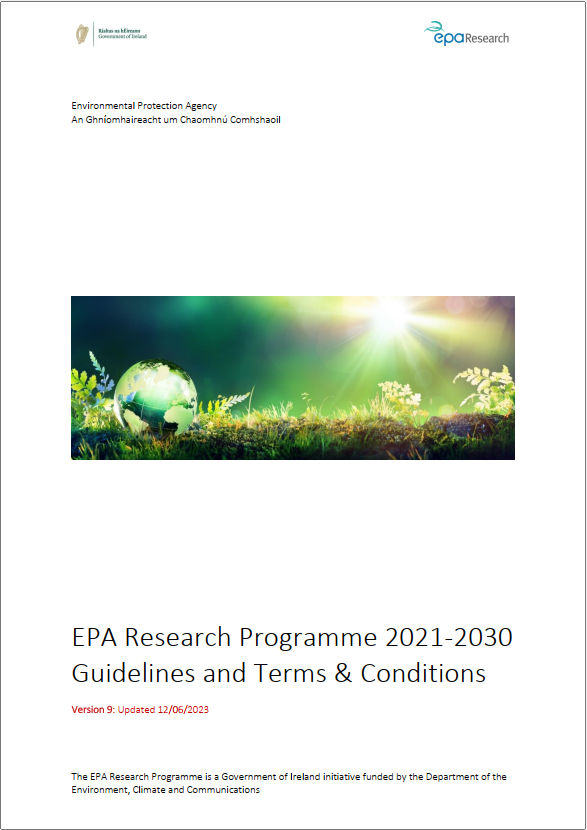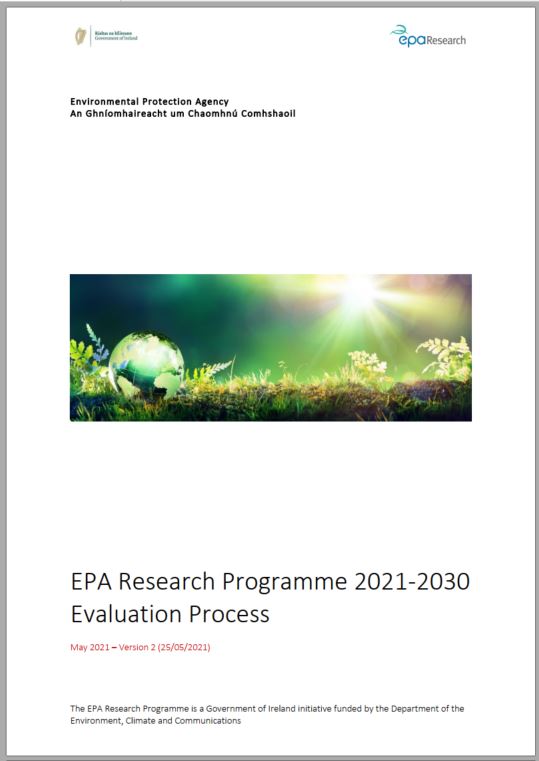Latest Research Publications
-449.jpg)
Research 449: Transboundary Climate Risks for the Island of Ireland (TCRII)
Authors: Conor Murphy, Kevin Leonard, Rory Moore and Stephen Flood, February 2024
Year: 2024
The island of Ireland is one of the most open economies in the world for trade and finance. While Ireland’s open economy, trade and finance links have helped to generate significant wealth and improve living standards, this also makes Ireland among the most vulnerable to climate change’s impacts on international trade. Transboundary Climate Risks (TCRs) cross national borders and are associated with the impacts of climate change. The Transboundary Climate Risks for the Island of Ireland (TCRII) project undertook a literature review and worked with stakeholders to identify approaches for the assessment of TCRs and synergies that can be leveraged on an all-island basis. The findings informed recommendations for better accounting for these emerging risks, to realise the national climate objective of achieving a climate-resilient economy and society by 2050.
.jpg)
Research 448: Antimicrobial Resistance and the Environment – Sources, Persistence, Transmission and Risk Management (AREST)
Authors: Dearbháile Morris, Niamh Cahill, Catherine Burgess, Enda Cummins, Finola Leonard, Brigid Hooban, Carlos Chique, Ciara Tyrrell, Shun Wang, Ciarán Monahan, Aoife Joyce, Kelly Fitzhenry, John Cullinan, Georgios Miliotis, Louise O’Connor, Deirdre Prendergast, Martin Cormican, Rita Gately, Rajat Nag, Fiona Brennan, Fiona Walsh and Xinmin Zhan, February 2024
Year: 2024
Antimicrobial resistance (AMR) is recognised globally as one of the greatest challenges to human and animal health. In 2021, Ireland’s second National Action Plan on AMR (iNAP2) strengthened Ireland’s commitment to tackling the challenge of AMR using the ‘One Health’ approach. The role of the environment in the persistence and transmission of AMR is the least studied element of the One Health paradigm. This was further highlighted by the analysis commissioned by the EPA in preparation for iNAP2. The findings of the AREST project add significantly to our understanding of this environmental dimension of AMR by (1) providing evidence of the extent of contamination of the Irish environment with antimicrobial-resistant organisms and antimicrobial resistance genes of clinical concern, (2) generating national-level data on the key sources, hotspots and drivers of AMR in the environment from the human health and agriculture sectors, and (3) providing key data and recommendations.

Research 447: Macroalgal Blooms in Transitional and Coastal Waters; Management – Pressures,Policy and Solutions (MACRO-MAN)
Authors: Ricardo Bermejo, Nessa Golden, Sara Haro, Sita Karki, Michéal MacMonagail,Sara García-Poza, Teresa Navarrete-Fernández, Benedikt Brunner, Kay Knöller,Mark Healy, Owen Fenton, Per-Erik Mellander and Liam Morrison., January 2024
Year: 2024
Eutrophication of waters and consequent algal blooms place significant pressure on marine ecosystems. Reducing the nutrient load of these waters is essential for ecosystem restoration. The MACRO-MAN project developed innovative methods to assess the environmental quality of Irish estuaries, and to identify drivers of and management strategies for macroalgal blooms. The potential risks associated with macroalgal blooms were considered in a global change context (e.g., climate change, emerging contaminants, biological invasions) in order to investigate the impact on ecosystem functioning and services provided by Irish estuaries. Using Earth Observation technologies, the project mapped the spatial and temporal distribution of brown, green and red macroalgal blooms in Irish estuaries, including the reconstruction of the invasion of a red Asian seaweed (Gracilaria vermiculophylla) in the Clonakilty estuary.
-Oct23-v1_Part1.jpg)
Research 446: CROSSDRO: Cross-sectoral Drought Impacts in Complex European Basins
Authors: Conor Murphy and Sam Grainger, January 2024
Year: 2024
Droughts are pervasive and hazardous events that impact multiple domains, including agriculture, water resource management, ecological management, infrastructure, waterway navigation and forestry. A drought in Ireland in 2018, had severe socio-economic and environmental impacts across sectors: agriculture suffered from reduced grass growth, fodder shortages and decreased crop yields, peatlands faced increased wildfire risk and ecological degradation and water management was challenging amid supply issues. In addition, canals, waterways, and rivers experienced weed growth, navigation problems, fishing restrictions and reduced fish health and forestry saw increased tree deaths, especially in peatland plantations. The CROSSDRO project collated a network of river flow gauges across Europe, covering the period 1962–2017, for the analysis of hydrological drought.

Research 445: Transboundary Adaptation Learning Exchange: Policy and Practice
Authors: Denise McCullagh, Anna Beswick, Stephen Jones, Jane McCullough and Jeremy Gault, December 2023
Year: 2023
The need for transformational climate adaptation that moves beyond the business-as-usual approach currently employed by a large majority of governments is becoming increasingly evident as the environmental, social and economic benefits of early and proactive adaptation are observed. The pressures of climate change require society-wide ownership of adaptation. However, for this to happen, all voices need to be represented in decision-making throughout the adaptation process. An assessment of the national climate adaptation policies of the five jurisdictions of Ireland and the UK was conducted to identify barriers and enabling conditions for adaptation in each of the jurisdictions.
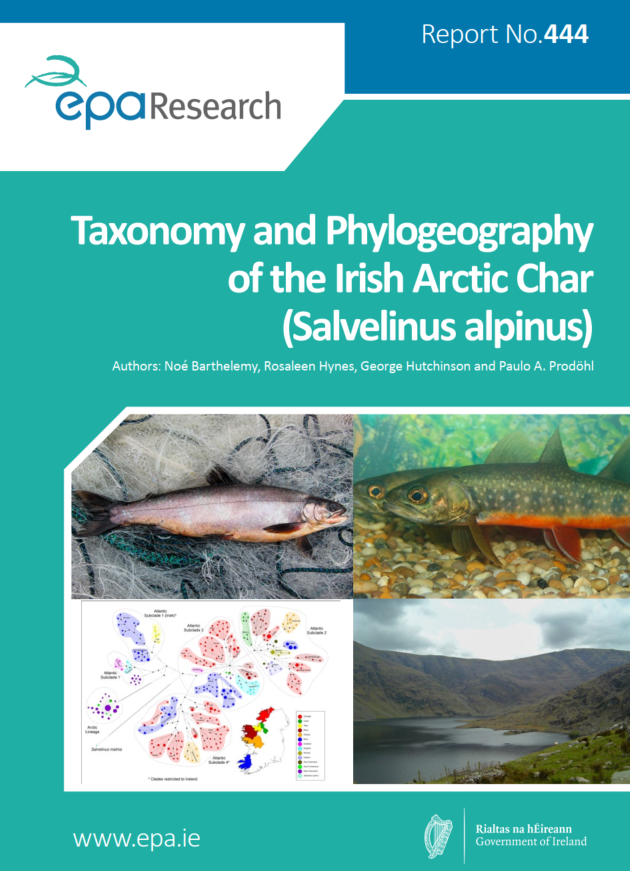
Research 444: Taxonomy and Phylogeography of the Irish Arctic Char (Salvelinus alpinus)
Authors: Noé Barthelemy, Rosaleen Hynes, George Hutchinson and Paulo A. Prodöhl, December 2023
Year: 2023
Salmonid Arctic char is a freshwater fish species vulnerable to low oxygen levels, rising temperatures associated with global warming, threats from invasive species, and water abstraction activities. There is an urgent need for effective conservation and management of Irish Arctic char, as it is recognised as “vulnerable” in the Irish Red Data Book. The study examined the role of scientific communication in influencing policymakers' decisions on conservation of this species.
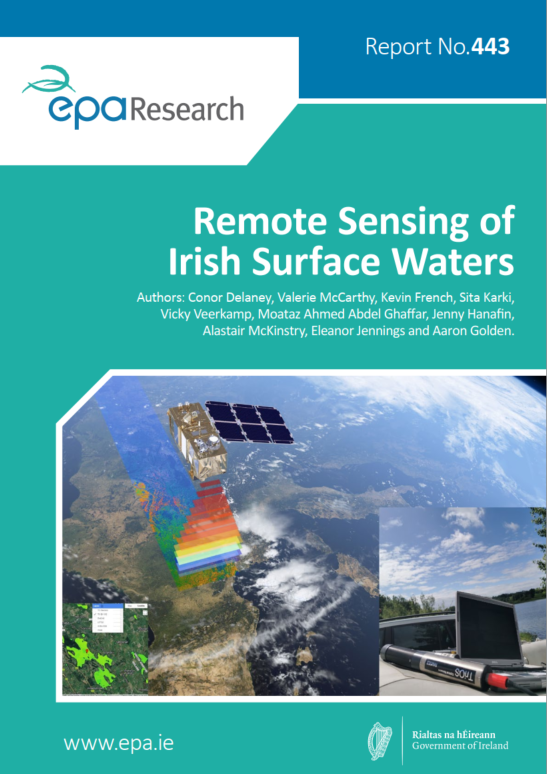
Research 443: Remote Sensing of Irish Surface Waters
Authors: Conor Delaney, Valerie McCarthy, Kevin French, Sita Karki, Vicky Veerkamp, Moataz Ahmed Abdel Ghaffar, Jenny Hanafin, Alastair McKinstry, Eleanor Jennings and Aaron Golden, November 2023
Year: 2023
Lakes, estuaries, and coastal waters are crucial for human well-being. Lakes are critical sources of drinking water, and support irrigation, fisheries, and aquaculture activities. These waters are also important for recreation and tourism and support high levels of biodiversity. The number and diversity of water bodies in Ireland makes regular in situ monitoring an acute challenge for regulatory authorities. Ireland has legally binding legislative obligations under the WFD. This project determined if the use of freely available Earth observation data from both the Copernicus and Landsat Earth observation programmes could offer a cost-effective and evidence-based means of remotely monitoring such water bodies in Ireland.
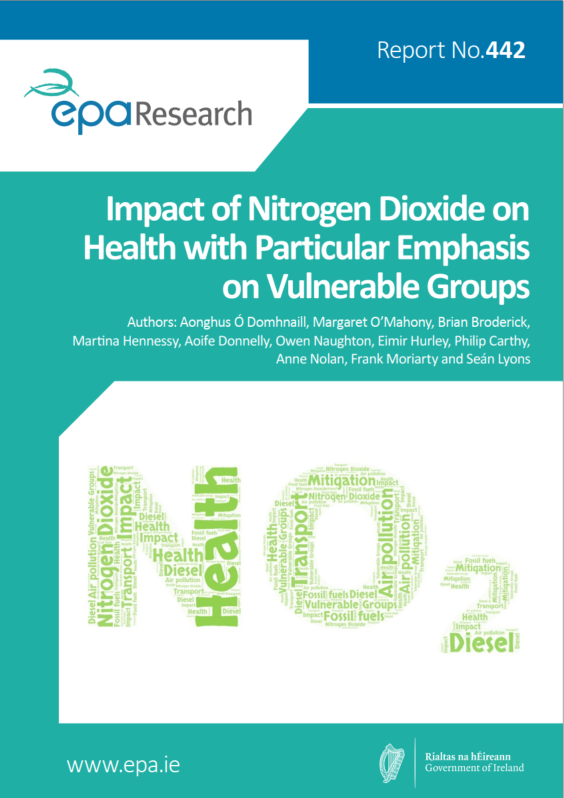
Research 442: Impact of Nitrogen Dioxide on Health with Particular Emphasis on Vulnerable Groups
Authors: Aonghus Ó Domhnaill, Margaret O’Mahony, Brian Broderick, Martina Hennessy, Aoife Donnelly, Owen Naughton, Eimir Hurley, Philip Carthy, Anne Nolan, Frank Moriarty and Seán Lyons, November 2023
Year: 2023
Exposure to nitrogen dioxide (NO2) is associated with adverse effects on hospital admissions for various diagnoses; respiratory illnesses such as asthma, cancer, adverse birth outcomes, as well as mortality. The main source of NO2 in Ireland is road transport, particularly diesel engines. Other sources include off-road machinery, industrial and construction activities, and electricity and heat production. This research project analysed associations between the model estimations of NO2 and the health data of 8000 adults aged over 50 years. Using the HSE-PRCR prescribing database, the project found a positive association between respiratory item prescription rates and PM2.5 levels, while the results for NO2 were inconclusive. The project also developed an enhanced Wind Sector Land Use Regression (WS-LUR) model that estimates ambient NO2 concentrations at any location in Ireland with particular emphasis on vehicle fleet changes and traffic flow impacts on NO2.
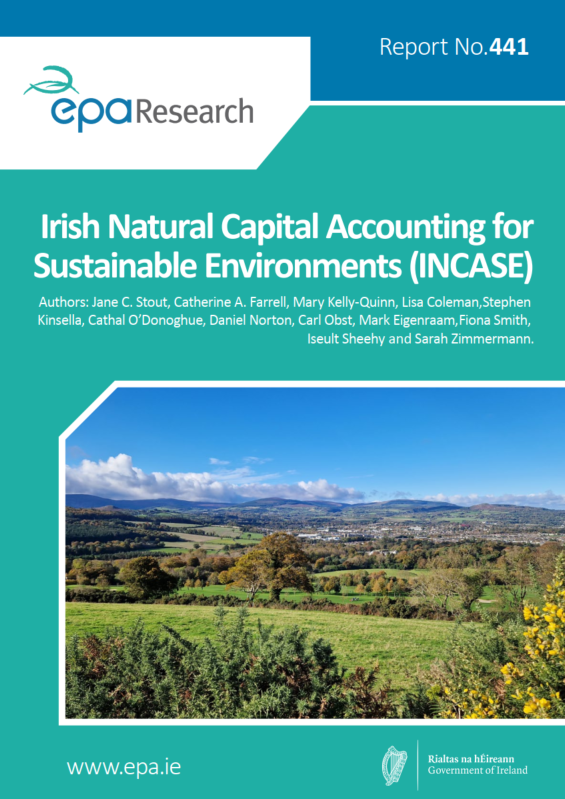
Research 441: Irish Natural Capital Accounting for Sustainable Environments (INCASE)
Authors: Jane C. Stout, Catherine A. Farrell, Mary Kelly-Quinn, Lisa Coleman,Stephen Kinsella, Cathal O’Donoghue, Daniel Norton, Carl Obst, Mark Eigenraam,Fiona Smith, Iseult Sheehy and Sarah Zimmermann., November 2023
Year: 2023
Nature continues to be degraded globally. Despite our societies and economies depending on it, we often ignore or undervalue this degradation. To bring nature into everyday decision-making, the natural capital approach deliberately uses the language of business and economics. In this context, nature can be thought of as an array of stocks of natural assets, incorporating biodiversity, air, water and geology. The condition of these stocks influences the flow of goods and services, and the benefits that our societies and economies derive from these assets. This EPA Research Report provides insights into the development of natural capital accounts at the catchment scale in Ireland. It aims to provide a comprehensive view of the stocks of natural capital assets and the flows of services, along with guidance on how to scale-up the process to national level.
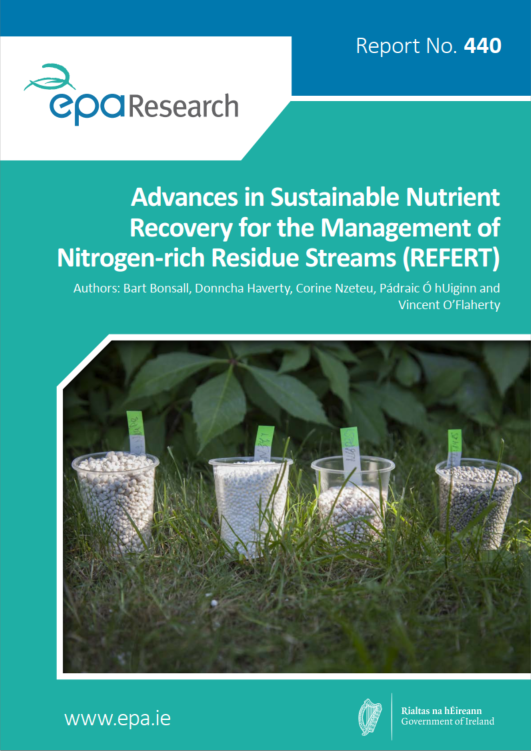
Research 440: Advances in Sustainable Nutrient Recovery for the Management of Nitrogen-rich Residue Streams (REFERT)
Authors: Bart Bonsall, Donncha Haverty, Corine Nzeteu, Pádraic Ó hUiginn and Vincent O’Flaherty, November 2023
Year: 2023
Across the EU, anthropogenic sources of nitrogen (N) threaten water and air quality. Agriculture is also a significant source of N and GHG emissions linked to climate change. N for crops is sourced from mineral fertilisers, livestock manures and anaerobic digestion digestates. Landfill leachates also generate N and GHG emissions. The EPA funded this research to identify cost-effective methods to mitigate the release of N and GHGs from ammoniacal streams.

Research 439: Research on the Environment, Health, Consumer Behaviour and the Economy: ESRI Research Programme on Environmental Socio-economics 2020–2022
Authors: Ylva Andersson, Peter Barlow, Philip Carthy, Kelly de Bruin, Míde Griffin, Seán Lyons, Pete Lunn, Bertrand Maître, Likun Mao, Maria Martinez Cillero, David Meier, Gretta Mohan, Kieran Mohr, Anne Nolan, Brian O’Connell, Vincent O’Sullivan, Aidan Sloyan, Shane Timmons, Miguel Tovar Reaños, Brendan Walsh and Aykut Mert Yakut, October 2023
Year: 2023
The main objective of this EPA-ESRI collaboration is to produce policy-relevant applied research at the interface between the environment, economy, and society. This report provides a summary of 12 studies, produced by the ESRI, that use a range of data and methodological approaches to provide insights into the environmental challenges facing Irish society. The studies include analyses of the impact on healthcare systems from the smoky coal ban, living in areas of higher PM2.5 levels, e-coli exceedances in drinking water and water related diseases in the summer months. It also examines the potential for a “green VAT”, the levels of emissions embedded in imports and the best ways to present information to people to enable action.

Research 438: The Use of Earth Observation and Machine Learning for Industrial and Waste Crime Identification and Prevention
Authors: Zane Ferch, Steve Coughlan, Charlotte O’Kelly and Sinead McGlynn, October 2023
Year: 2023
This research provides enforcement authorities with viable options to use cost effective technological tools to quickly detect and react to industrial and waste crime.

Research 437: PHENOGRASS – The Phenology of Perennial Ryegrass and its Potential Contribution to Grassland Carbon Sequestration
Authors: Jonathan Yearsley, Rainer Melzer and Carl Frisk, September 2023
Year: 2023
Agricultural grasslands are a crucial part of Ireland’s agroeconomy. Within these grasslands, perennial ryegrass (Lolium perenne) is the dominant species and underpins much of their performance, of which the timing of growth (i.e., the phenology of grasslands) is an important aspect. A late start or an early end to the growing season requires grazing livestock to be housed for longer, which in turn requires farmers to have additional reserves of forage. Reserves depend on the length of the grass growing season. Seasons with exceptionally late starts and those with poor forage harvests have been major contributory factors to past fodder crises, with broad consequences for the economy, animal welfare and human well-being.

Research 436: Assessing Potential for North Atlantic Integrated Atmospheric Research
Liz Coleman and Frank McGovern, August 2023
Year: 2023
The impact of human activity since the Industrial Revolution has altered the environment, pushing its stability to critical limits, with real implications for societal, economic and environmental systems. The planetary boundaries framework has provided a powerful tool for communicating the individual and collective threats arising from unsustainable post-industrial development, yet actions and responses take place at regional, national and local levels.

Research 435: Industrial Water 4.0 – A Framework for Catchment-based Digitally Integrated Industrial Water Stewardship
Authors: Colm Gaskin, Ken Stockil, Thomas Track, William Horan, Andres Lucht and Paul Conheady, July 2023
Year: 2023
Industrial activity is intrinsically linked to the accessibility and availability of water. The increasing global demand for industrial water poses a significant risk management challenge for organisations aiming to decouple the growth of production capacity from unsustainable consumption. This report presents a framework for industrial water users to adopt Industrial Water 4.0.
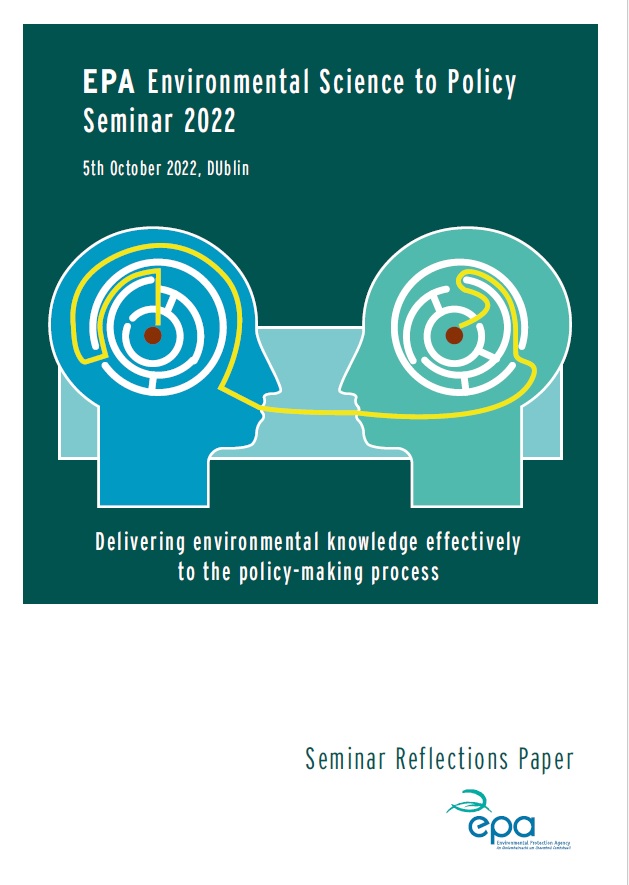
EPA Environmental Science to Policy Seminar 2022 - Seminar Reflections Paper
Year: 2023
The EPA organised an inaugural Environmental Science to Policy Seminar in October 2022. Its objective was to explore how best to improve the delivery of evidence and knowledge to the policymaking system. The event brought together policymakers, knowledge transfer practitioners and scientists from across government and academia to share experiences on the issues, constraints, good practices and ways forward. This Seminar Reflections Paper captures the key themes and recommendations that emerged during the seminar, to support and inform the national Science to Policy agenda.
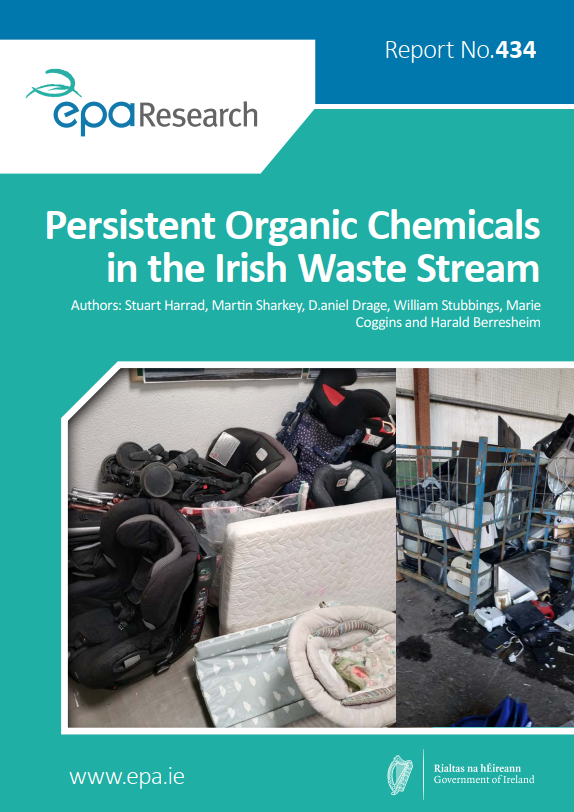
Research 434: Persistent Organic Chemicals in the Irish Waste Stream
Authors: Stuart Harrad, Martin Sharkey, D.aniel Drage, William Stubbings, Marie Coggins and Harald Berresheim, June 2023
Year: 2023

